By Debbie Burke
Writing conferences are a mix of exhilarating and exhausting, inspiring and overwhelming, work and play.
Terry Odell and I recently attended the Flathead River Writers Conference. In today’s and tomorrow’s posts, you’ll hear about the experience from each of us. Terry also tried out her new Olympus camera and will hopefully share scenic shots tomorrow.
Meanwhile, here are a few photos from the conference taken by other guests:
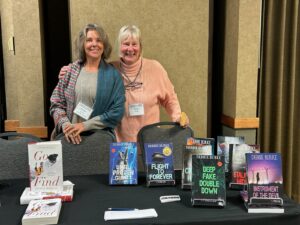
Susan Purvis and Debbie Burke at the book table
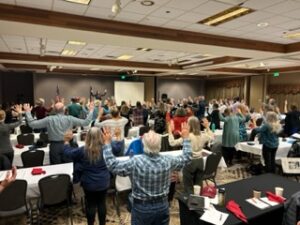
No, this isn’t a stick up. Dr. Erika Putnam leads the audience in exercises to alleviate “writer’s slump” from hours bent over the computer.
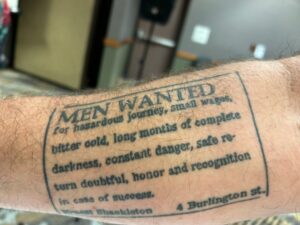
Author/storyteller Chris La Tray is Montana’s Poet Laureate who starts each morning by reading the tattoo on his arm—a challenge from Antarctic explorer Ernest Shackleton.
It reads: “Men Wanted for hazardous journey, small wages, bitter cold, long months of complete darkness, constant danger, safe return doubtful, honor and recognition in case of success.”
Does that sound a little like writing? 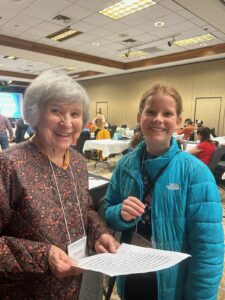
A young writer shares her story with a friend. Isn’t this what conferences are all about?
A couple of days before the conference, Terry arrived from Colorado to check out this corner of Montana. On Thursday, we drove around Flathead Lake, while showers and sunshine played tag.
On Friday, the sun won out over showers. In Glacier National Park, snow closed the higher elevations of Going-to-the-Sun Road so we didn’t make it up to Logan Pass (6000+ feet) to see mountain goats and bighorn sheep. But we visited Lake McDonald, waterfalls, and the historic lodge. Any day at Glacier is a good day.
As a Montanan, I performed my sworn, sacred duty to introduce Terry to huckleberry-peach pie and huckleberry chocolate.

Literary agent Zach Honey
Now to the conference highlights from one of the guest agents, Zach Honey of FinePrint Literary Management.
Zach was born in Greensboro, NC and raised in Montana, leading to an affinity for both sweet tea and waist-deep snow. He specializes in thrillers in rural settings because of the potential for dark, scary adventures in remote, isolated locations.
Zach gave a talk about the elements of suspense that’s tailor-made for the crime dogs of TKZ. He kindly agreed to allow me to unpack his presentation. Thanks, Zach!
Suspense and mystery apply to all stories in all genres.
Why does the reader keep turning pages?
Why does the listener lean toward the person telling the story?
Why does the viewer keep watching the movie?
To find out what happens next.
Suspense contains three elements:
- Hope – where the reader experiences pleasure about the prospect of desirable events.
- Fear – where the reader experiences worry about undesirable events.
- Uncertainty – the cognitive imbalanced state of not knowing the outcome of events.
When readers feel a close connection to a character, esp. the POV character, they hope for a good outcome for that character and fear the danger that threatens the character.
Villainous characters also need to connect with readers, although it’s a different type of connection. Readers are intrigued and fascinated by evildoers. That interest can be deepened and made more complex by incorporating backstory. Why is the villain willing to or driven to step over the line? Will s/he get away with it?
Suspense can be short term for the duration of a scene or long term sustained over the entire book or film.
Types of suspense:
Mysterious suspense – Info is withheld from the reader.
Horrific suspense – Something bad will happen. Often a tragic ending. Examples: Stephen King, Dean Koontz.
Romantic or comedic suspense – Something bad will happen that may also be funny/entertaining and usually leads to a happy ending.
Paradox of suspense: Suspense contains an inherent paradox because readers or film viewers often know the end beforehand. Knowledge of the end should preclude suspense, yet it doesn’t.
Readers continue to read despite knowing who the murderer/villain is.
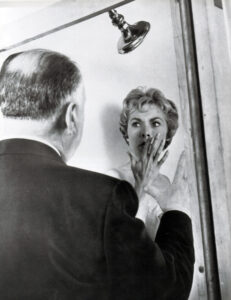
Photo credit: Laura Loveday, CC BY-NC-SA 2.0 DEED
People who’ve watched Psycho multiple times still jump at the shower scene.
That leads to the question: Why does someone who already knows the outcome still feel suspense?
Zach offered these theories:
Moment by moment forgetting – the reader/viewer is so caught up in the present tense moment that they temporarily forget the outcome.
Desire/frustration theory of suspense – The reader/viewer feels frustrated because they want to change the outcome of an imminent event, but they can’t. That’s why the movie audience shouts, “Don’t go down in the basement!” Of course, the character inevitably does and meets their doom.
Zach cited Alfred Hitchcock as the renowned master of suspense. Hitch defined differences between mystery and suspense:
Mystery is an intellectual process.
Suspense is an emotional process.
Mystery requires withholding information from the reader/viewer.
Suspense requires giving information to the reader/viewer.
A classic example is the bomb under the table.
In mystery, only the character who placed the bomb knows it’s there. None of the other characters nor the reader is aware of it. When it explodes, it causes immediate surprise and shock.
In suspense, the reader knows the bomb is about to go off, but the characters don’t know. The reader’s knowledge leads to excited, horrified anticipation of the disaster that’s about to happen. Five minutes of suspense delivers five seconds of surprise/shock.
When the reader or audience has more information than the character does, that also causes dramatic irony.
Dramatic irony has great impact on the reader. The combination of the intellectual process (knowledge of what happens next) together with the emotional process (the fear, hope, uncertainty of what happens next) delivers an effective power punch for authors to exploit.
Additional tools:
Raise the stakes – what will be lost if the hero fails?
Lower the hope – what if the hero can’t succeed b/c their abilities or resources are reduced?
Foreshadowing – creating dread for something that may happen in the future.
A big thank you to Zach Honey for explaining the mystery of suspense.
~~~
Stop by tomorrow to read Terry Odell’s impressions of the Flathead River Writers Conference.
~~~
TKZers – what is your favorite technique for building suspense in your stories? Are any of the tools that Zach mentioned new to you? If so, do you want to experiment with them?
~~~

Suspense is high but the price is low for Debbie Burke’s latest thriller Deep Fake Double Down. Only $.99 at this link.

It sounds like you had a great time, Debbie. Thanks to Zach for the helpful info!
Vera, it was a terrific conference. Zach’s presentation reinforced what I already knew but he added fresh material to chew on.
It was great meeting you and thanks again for your hospitality, Debbie. Yes, I have some pictures to share and they’ll be in my post tomorrow. For the record, I’m very much a mystery person. Cut my teeth on Sherlock Holmes, and I prefer to follow the detectives rather than knowing more than they do.
Terry, after all these years of “knowing” you here at TKZ, it was fun to finally meet you in person. The weekend’s big mystery was what happened to your half of the huckleberry-chocolate bar. I really didn’t mean to steal it–it got lost in my bag. Honest.
I owe you a whole one as restitution for my crime.
Terry, great fun to see you in Kalispell! I’m glad you enjoyed the conference and look forward to your take.
Thanks for sharing. All these years living in Montana and I’ve never heard of huckleberry-peach pie. I have, however, had the huckleberry shakes at the truck stop in Missoula. A trip to Big Arm always includes a stop at Muralt’s. 🙂
Michelle, Eddie’s at Apgar has huckleberry-peach pie to die for. When you come to visit, we’ll go there.
I can also recommend the huckleberry-peach pie at Loula’s in Whitefish.
Leslie, let’s sponsor a pie shootout. We’ll be the judges.
Thanks, Debbie and Zach for a very helpful discussion of the mystery of suspense.
And, thanks Debbie, for a report on the Flathead River Writers Conference. Is it a yearly event? You make a compelling argument for attending next year.
I don’t recall reading or hearing the label, dramatic irony, in a discussion of the elements of suspense. That is an area I need to experiment with, and use, more.
Wonderful post, Debbie. Have a great week!
Thanks, Steve. The conference has been going strong for more than 30 years. You’re always welcome in Montana!
Bring a big stock of your beautiful legacy wood pens–lots of writers would buy them.
Thanks, Debbie.
Great post. I especially love the comparison between suspense and mystery, how they’re opposites in some ways but work perfectly together.
My favorite technique for suspense is actually having dual POV. I can reveal bits of information in one POV that the other character doesn’t know, and might never know. Besides info about what’s going to happen, there’s the added suspense of wanting to know what the other character thinks of the scene, especially if you KNOW they have a stake in what happened.
Azali, multiple points of view are a terrific technique. Each character has a bit of info the others don’t know. The reader knows all the info and anticipates the pending collision when the puzzle pieces eventually snap together.
You’re so right about knowing the stakes. That understanding amps up reader interest.
Thanks for adding great points to the discussion.
Perfect definition of mystery vs. suspense, Debbie! Maybe the best I’ve ever read. Sounds like a fantastic conference. My characters just arrived in Montana, so I’ll be in touch after I squeeze out the first draft. 😉 Huckleberry chocolate? Sounds delicious!
Sue, you definitely need to make a research trip to Montana! I can show you many great locations for murder 😉
Debbie, what a wonderful conference and a terrific distillation of the suspense workshop! Thanks for sharing both. The conference looks like a fantastic one, well worth attending. The tips on suspense are excellent.
However, for me, while he’s right that mystery is intellectual, I also see mystery fiction as “suspicion fiction,” and suspicion is an emotional perspective on things, and that’s how I can introduce suspense into the “intellectual” investigation, especially since I write about amateur sleuths. Couple that with a slow building tension, offset with bouts of cozy fun, and I hope to keep the reader turning pages.
Huckleberry chocolate sounds supremely delicious 🙂
Dale, “suspicion fiction” is a great term I hadn’t heard of before. You’re absolutely right that suspicion adds the emotional component to an intellectual puzzle. Sounds like a future TKZ post (hint, hint).
Thanks for another tool to add to our tool belts!
Thanks, Debbie! As far as I know, it’s my own term, but it wouldn’t surprise me to learn that someone else has written about it. I suspect I’ll take your hint 😀
Wonderful post, Debbie! Next year’s Flathead River Writers Conference might see a big jump in attendance. You’re a very good spokesperson. And you’ve given me a mystery to solve: what does huckleberry-peach pie taste like? Sounds delicious.
Zach’s insights are very helpful. I recently experienced the Paradox of Suspense. I was re-watching the movie The Spirit of St. Louis in preparation for an upcoming post. It’s the story of Charles Lindbergh’s historic flight across the Atlantic Ocean. Everybody knows the story, and I’ve seen the movie several times, but the take-off scene is so suspenseful, I was holding my breath.
Thanks to you and Zach.
Thanks for your kind words, Kay. Come to the conference next year and I’ll buy the pie!
The paradox concept was new to me, although I experience it often with movies I’ve seen many times.
You just created suspense for your upcoming post–Jimmy Stewart was perfect in that role.
I agree. I can’t imagine any other actor in that role.
Another helpful blog, Debbie. And the conference sounds fun and informative.
Thanks, Elaine. Hope you’ll visit sometime.
Sounds like a great conference!
What’s my favorite suspense technique? Well, actor David Lyons once said that the measure of a superhero is always his nemesis. It helps to create suspense when you give the protagonist a worthy adversary. The villain must be an equal match. A story is always more interesting when we make the reader worry and keep worrying. It mustn’t be too easy for the protagonist to escape from a perilous situation. Make the reader care about the protagonist, and then keep raising the stakes. I want to write a villain that readers will remember long after the story ends.
“I want to write a villain that readers will remember long after the story ends.”
An excellent goal, Joanne.
Thanks for adding that tip from David Lyons. A great villain forces the hero to dig deeper and work harder. When the reader doesn’t know if the hero can rise to the challenge, suspense becomes overwhelming and pages turn faster.